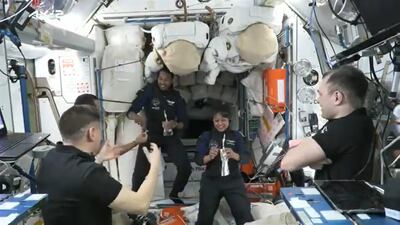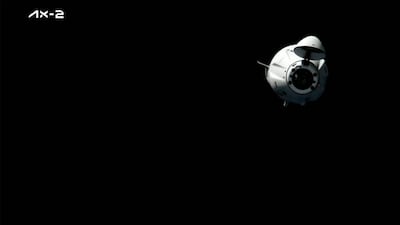The Arab population on the International Space Station increased to three after two Saudi astronauts joined the UAE's Sultan Al Neyadi in orbit on Monday.
Rayyanah Barnawi, a research scientist, and Ali Al Qarni, a fighter pilot, have arrived at the station for an eight-day science mission.
They became the first Saudi citizens in space since 1985, when the kingdom sent Prince Sultan bin Salman on Nasa's Space Shuttle for a week-long trip.
The SpaceX Dragon capsule carrying the Saudis and two American astronauts – Peggy Whitson and Jeff Shoffner – docked at the science laboratory at 5.12pm GST, as part of the Axiom 2 mission.
“Hello from outer space,” Ms Barnawi said earlier in the day while cruising aboard the Dragon.
“It feels amazing to be viewing Earth from this capsule. We're here feeling microgravity.”
Ms Barnawi, 33, has also floated her way into the record books as the first Arab woman to go on a space mission.
She gave a teary-eyed speech during a welcoming ceremony on the ISS, where she said she was proud to be representing her country.
“I'm representing the hopes and dreams of everyone back home and in the region,” Ms Barnawi said.
“I'm very happy to be here. I'm also very glad that I've received extensive training for trainers who have trained previous astronauts.
“I'm going to enjoy this experience to the max.”
Dr Al Neyadi welcomes Arab colleagues

Dr Al Neyadi, who is on ISS for a six-month mission, welcomed his Arab colleagues with dates.
He had been making preparations for the Saudi astronauts' arrival for several days, including helping to relocate a Dragon capsule to another docking port to free up a parking spot for their spacecraft.
He also monitored their capsule's arrival at the station from the cupola – the observatory on the ISS – and took several photographs.
Science work on the space station
Ms Barnawi has a decade of experience in cancer stem cell research and one of her experiments on the ISS will focus on that area.
She will be studying the inflammatory response of human immune cells in microgravity.
This will help investigate changes in mRNA – a genetic material that tells the body how to make proteins.
The experiment has been sent by the King Faisal Specialist Hospital and Research Centre.
Mr Al Qarni will also be playing a crucial role in the mission, including taking part in several experiments assigned to him by Saudi researchers.
One of them includes testing different techniques in a cloud-seeding reaction chamber. This could help scientists in the kingdom invent new ways to carry out cloud-seeding experiments to increase precipitation levels over certain areas.
“It is such an honour and privilege to be here. I'm really excited to work alongside all of you,” Mr Al Qarni said.
“Thank you to the Saudi people because this mission isn't just for Rayyanah and I – it's for all of you.”
What the trip means for Saudi Arabia
This is the first human space flight under the kingdom's new astronaut programme, which was announced last year.
Saudi Arabia did not set up a long-term exploration programme when Prince Sultan returned from space nearly 40 years ago.
But it is now joining global space exploration efforts, including plans to send Saudis on long-duration space missions, including to the Moon and Mars.
The UAE is currently leading in space efforts in the Arab world, having sent two Emiratis to space and a probe to Mars. It has also attempted a lunar mission and will be sending a spacecraft to the asteroid belt.
Salem Al Marri, director-general of the Mohammed bin Rashid Space Centre, congratulated Saudi Arabia on its space mission.
“This achievement serves as a notable milestone for Saudi Arabia and marks a pivotal moment in history as it unites three Arab astronauts in space for the first time, including Astronaut Sultan Al Neyadi,” he said.
“The event serves as a powerful inspiration to the global space community, highlighting the profound impact of diversity, innovation and international co-operation.”











